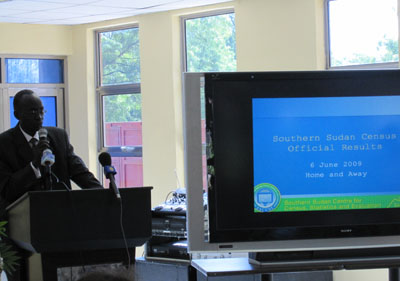
JUBA, Southern Sudan—The South Sudan census bureau on Saturday released the long-awaited official results of Sudan’s first census since 1983. The results of the census — a process that has been in the works since 2005 — have become a highly contentious issue miring relations between North and South; the distribution of the country’s population will be a central feature in Sudan’s upcoming elections in 2010 and the 2011 referendum to determine whether the country will split into two.
The South Sudan Center for Statistics, Census, and Evaluation, or SSCCSE, announced the results at a press conference attended by Sudanese and international journalists here in the southern capital. The SSCCSE collaborated with the northern government’s Central Bureau of Statistics, or CBS, to conduct the census, with each bureau directing the process for its respective region. In the Comprehensive Peace Agreement, or CPA, the ruling parties in the North and South agreed that census figures would be released only once both the Government of National Unity and the Government of South Sudan, or GoSS, had reviewed and signed off on the final results. However, much to the chagrin of the SSCCSE and GoSS, the government in Khartoum released figures for both the North and South a full month before the SSCCSE’s release. The southern bureau continues to contest the validity of the northern bureau’s findings based on a number of complaints about the transparency and technical accuracy of the CBS’s enumeration process.
One major complaint of the SSCCSE is that the North’s CBS refused to exchange “raw data sets” with the SSCCSE, which would have enabled both parties to determine if there were any discrepancies or tampering with the raw data from each other’s enumerations. The CBS had agreed to do so during the census process, but ultimately refused to exchange their data. The SSCCSE says that that their offer to exchange raw data still stands, but that the CBS has not given any indication that it will cooperate in this process.
As SSCCSE Chairman Isaiah Chol Aruai told NPR’s Gwen Thompkins in an article on the brewing census controversy back in April:
Political leaders, not census officials, will determine the release of the results…The census is political. Everything is politicized in Sudan.
Indeed, the official release, where SSCCSE chairman Chol led a discussion of the results, was itself quite political. Although the GoSS presidency had finally given the SSCCSE permission to officially release their results earlier this week, the president of southern Sudan, Salva Kiir, has stated repeatedly that the southern Sudanese population is “unhappy with the census results.”
President Kiir and other GoSS officials claim that the southern population is much larger than 8.26 million—the number tabulated by the SSCCSE and therefore enumerated for and by southern Sudanese themselves. Thus, President Kiir and his government are rejecting the results of a census conducted by his own people and by the southern census commission, which has been advised since 2005 by international census experts. President Kiir claims that Southerners make up at least a third of Sudan’s total population, while the census results show that the South accounts for only 22 percent of the Sudanese population.
At the official release, SSCCSE Chairman Chol said that:
We stand by our results…Anyone who wants to examine our data should come forward and we will present it to them…
The reason for President Kiir’s concern is that a key question regarding the census results remains unanswered: will the census results be used to determine the new wealth- and power-sharing ratios following southern Sudan’s self-determination referendum in 2011?
President Kiir has demanded that the 2008 census results not be used for any power and wealth sharing discussions after southern Sudan’s referendum. The wealth sharing question will be particularly contentious should the South vote for its independence from northern Sudan, given that the majority of the oil fields in Sudan are within the South’s borders. Chairman Chol deflected the question, saying “how the results will be used ought to be discussed by [Sudan’s] politicians.”
Chairman Chol was right when he said that everything in Sudan is politicized. The hotly contested census results, which should be evaluated on the technical merits of the process, will likely become another political obstacle and source of tension between the North and South as Sudan inches closer to 2011.

